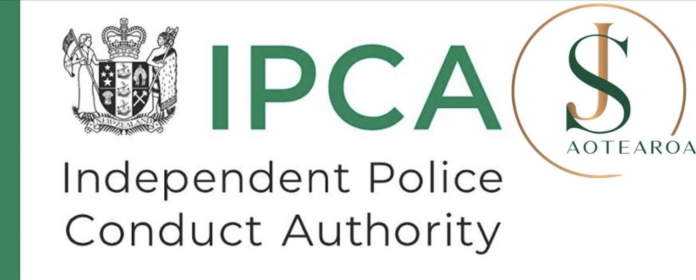Social Justice Aotearoa will ensure New Zealand has a just, civil, and transparent police force by advocating for the Independent Police Complaints Authority to be Headed by an independent suitably qualified person from another commonwealth country such as Australia, Canada, or the United Kingdom.
For SJA and, I believe, the whole of New Zealand having an independent governing body of the New Zealand Police is not only democratic but vital.
In New Zealand the IPCA has ex police officers employed whom carry out investigations into public accusations of wrongful policing among other investigations of policing and oversite.
I ask a very simple question, “How can any investigation be independent when ex police officers are doing the investigations? And the head of the IPCA, Judge Kenneth Johnston KC, whole career has been involved with policing.
I do not question Judge Johnstons creditability, but I do question how he will change an IPCA that has been questionable virtually since its inception some thirty-four years ago.
I applauded Green MP, Golriz Ghahraman, when earlier this year she questioned the integrity of the IPCA when she asked why, on average, only 2% of all cases referred to the IPCA, are investigated.
Wouldn’t it be a public expectation that every case or complaint referred to the IPCA is investigated? For SJA the answer must be yes.
Vision
The Police are there to protect the citizens of New Zealand and fairly enforce the laws of our land in an open, honest, and transparent way.
This is all we are asking for and our police practises are all too often being brought into question.
The public of New Zealand should have faith in our police and more importantly feel assured that our police are independently overseen.
Should any police practise or action be legitimately brought into question there must be a full and independent investigation into all allegations.
SJA will always stand beside this statement and will advocate for this until it is achieved also advocating for an independent enquiry with honest and independent results. All investigations must be led/overseen by a suitably qualified person who is not a citizen of New Zealand and has no connection to New Zealand or any government department. This was done in the Arthor Allan Thomas inquiry where R. L. Taylor, a former Justice of the Supreme Court of New South Wales headed that inquiry. To achieve this the current head of the IPCA would need to be replaced.
Values and Principles
That no person that has been employed in any capacity by the New Zealand police can be employed or contracted to work for the IPCA, which we believe makes the governing body overseeing the New Zealand Police totally independent.
Should any police practise or action be legitimately brought into question there must be a full and independent investigation into all allegations.
Everyone is entitled to justice, to a fair hearing, and to be treated with respect in the justice system including within any investigation within the Independent Police Complaints Authority.
The rule of law and judicial independence are fundamental values that should be protected; justice should follow transparent and fair processes, and the right to justice must be equitably protected in all its forms including within all activities and investigations the Independent Police Complaints Authority are involved in.
International public law obligations should be fairly and openly honoured and respected by the Independent Police Complaints Authority.
We will ensure that everyone before the Independent Police Complaints Authority, at any stage of the process, regardless of gender, race, origin, or financial status, is treated equally, accorded due process, and without any limitation on their right to the truth.
Our aim
To create a totally independent body whom the public can trust to oversee any policing concerns/complaints that arise.
Jackie Foster, CEO, Social Justice Aotearoa




Geo. Orwell: “People sleep peaceably in their beds at night only because rough men stand ready to do violence on their behalf.”
Excellent and totally correct.
With mercenary Mitchell about to take the reins of Police force I can see trouble and civil unrest.
The IPCA is a joke. An ex policeman turned defence barrister once opined to me that the police has no fear of it or respect for it at all in its role as watchdog, except for the the most serious and egregious cases of misconduct.
Routine petty police corruption, such as lying in court about defendant statements and behaviour, the massaging, suppression or manufacturing of evidence and testimony, ‘ensuring’ consistent testimony from various officers/witnesses etc ….
– these all fly by with a nod and wink from the IPCA, because, you know, one of the justifications given for keeping it essentially in police hands has been to take advantage of the investigative experience and knowledge of police culture and of the procedures that the police themselves possess. In other words, to take advantage of the large degree of empathy with the challenges that police face, and, perhaps, their need to sometimes bend the rules for results.
Anybody who thinks this current system isn’t heavily skewed to advantage the police is dishonest or blind.
I do not understand why police members involved in the many miscarriages of justice cases in New Zealand do not receive some form of punishment. Sometimes the victim of that police/prosecution mistake gets a payout but only after a massive effort. The government often spends millions on court cases etc yet those who caused that wasted expenditure are not asked for any reimbursement of the cost their actions caused.
I agree Bonnie,I lost some respect over the Peter Ellis case which was a witch hunt against a man because he dared to be gay
Hi Bonnie
SJA will advocate to make sure that no ex-police officer can be part of the IPCA, and we will not budge from that position. Thanks
Ms Collins, will probably be a minister in the new govt, and she previously put forward a proposal for the SFO to expand it’s powers, to include investigating corruption. This could include the ability to investigate police. But this should not be necessary, if the current police watchdog was sufficient.
When you look at what has been recounted in the abuse in care inquiry, you can see that whole sectors of society can be criminally harmed, and the parts of the public service that were supposed to act, including the police, just turned a blind eye. And the same with the supposed watchdogs. Is there some unwritten code going on here? What is it that the public service decision makers are afraid of, when it comes to having proper oversight? If this can be found out, then it can be addressed.
It explains why the elder health commissioner now comes under the HDC, when the HDC hardly ever investigates anything. And the children’s commissioner now comes under the ERO, and the same thing will happen there. You don’t even need overt corruption, when you entrench it into the system.
In a small country, where degrees of nepotism can always occur, anyone can see that employing former NZ police by the NZ police watchdog, is a bad idea, is not sensible, is stupid, yet is tolerated, and will go on being tolerated, and it’s like getting your best friend who owes you a favours to mark your homework.
If the SFO had an anti-corruption function, then to avoid it being inundated with investigation requests, one system could be that applications for investigation, could only be submitted by a lawyer, which would mean there would already be some legal opinion, that a matter has been mishandled.
Bad practices happen in police, just as they happen all over the public service, because those who engage in it know there will be no repercussion. When did the public service commissioner last investigate a public servant for wrongdoing? It just doesn’t happen. Yet public servants should be held to a high standard of behavior, because they often function in an effective monopoly. They should set the example. But public servants who want to do the right thing, probably get weeded out early, and replaced by those who want to toe the line, and look after their own interests.
If police act improperly, there is not another police service that someone can go to. There are private investigators, so one answer could be, that if someone needs to get a private investigator to follow up on, what police should have done in the first place, to either show guilt or show innocence, then the cost of the private investigator, should end up being reimbursed by the police themselves.
Lee-Anne Cartier (Helen Milner) showing guilt, and Tim Mckinnel (Teina Pora) showing innocence, are examples of where police could not see, what was obvious to others, yet there was no investigation into why the police didn’t investigate properly. Police should at least be curious, given that they are supposed to be trying to solve matters.
Even the police association should be in favour of better oversight, because there are many very good police, but those that act improperly, then cast them all in a bad light. And when people lose trust in police, it becomes harder for police to function. For example, why would someone with important information provide it to police, if they had already reported something serious such as abuse in care, and know that the police did nothing? There are likely numerous persons out there, with information to solve numerous open cases, such as the Blades case, but have not yet come forward.
Doing some crystal ball looking, much police investigation may one day be replaced by artificial intelligence. Once A.I systems don’t just reach human abilities of analysis, but many times greater, even hundreds or thousands of times greater, and are able to gather huge amounts of information and analyze in microseconds, what would otherwise be too time consuming and impracticable for staff to do. An A.I system could basically know where everyone is all of the time, who they meet, and where they go, and what they do. And if a crime gets reported, could give a list of probable suspects, with reasons, and the probability of there involvement. A.I could gather all sorts of electronic information taken from internet traffic and cell phone tracking and voice recognition and cctv facial and number plate recognition and wifi handshakes from Chorus ONT’s and ATM access etc, and myriad other sources of information. Would take the human element out of the initial analysis, so even crimes committed by police or other public servants or the rich and powerful, will be looked into equally.
With police doing the practical side of crime investigation, of gathering physical evidence and interviewing and searches. And being able to spend more resources on prevention.
Even though he’s an ex police officer, the public would be much much comfortable with Tim Mckinnel being in charge of oversight of police, and Nicky Hager in charge of oversight of our spies. But the polys would never allow it, because these two would do the job a little too well.
Hi Dennis
Totally agree with all you have said, and thanks for taking the time.
SJA will never back down from this position.
Thanks again.
Only the people affected by corrupt policing can actually know how damaging it is to them and their family.
Tim McKinnel has done a wonderful job for a few but he is only one person and many accused cant afford or get the backing of someone like him.
Jackie if you and SJA can pull the IPCA into line through politics you deserve a knighthood, because many have tried and failed. I applaud you for what you are doing and will watch your journey with interest, admiration and support.
Hi Sally
I’m enjoying the political side of advocacy, and if SJA can achieve what Aotearoa needs through advocacy, that’s what we will do.
Thank you.
Great policy, well written and very clear on what you position is. The only worry I have, is now that we have a right wing punitive government with the addition of Winston, there will be very little support for constructive change. if SJA can get a review done and get independency of the IPCA it will be a huge achievement. Good luck.
Ms Collins, will probably be a minister in the new govt, and she previously put forward a proposal for the SFO to expand it’s powers, to include investigating corruption. This could include the ability to investigate police. But this should not be necessary, if the current police watchdog was sufficient.
When you look at what has been recounted in the abuse in care inquiry, you can see that whole sectors of society can be criminally harmed, and the parts of the public service that were supposed to act, including the police, just turned a blind eye. And the same with the supposed watchdogs. Is there some unwritten code going on here? What is it that the public service decision makers are afraid of, when it comes to having proper oversight? If this can be found out, then it can be addressed.
It explains why the elder health commissioner now comes under the HDC, when the HDC hardly ever investigates anything. And the children’s commissioner now comes under the ERO, and the same thing will happen there. You don’t even need overt corruption, when you entrench it into the system.
In a small country, where degrees of nepotism can always occur, anyone can see that employing former NZ police by the NZ police watchdog, is a bad idea, is not sensible, is stupid, yet is tolerated, and will go on being tolerated, and it’s like getting your best friend who owes you a favours to mark your homework.
If the SFO had an anti-corruption function, then to avoid it being inundated with investigation requests, one system could be that applications for investigation, could only be submitted by a lawyer, which would mean there would already be some legal opinion, that a matter has been mishandled.
Bad practices happen in police, just as they happen all over the public service, because those who engage in it know there will be no repercussion. When did the public service commissioner last investigate a public servant for wrongdoing? It just doesn’t happen. Yet public servants should be held to a high standard of behavior, because they often function in an effective monopoly. They should set the example. But public servants who want to do the right thing, probably get weeded out early, and replaced by those who want to toe the line, and look after their own interests.
If police act improperly, there is not another police service that someone can go to. There are private investigators, so one answer could be, that if someone needs to get a private investigator to follow up on, what police should have done in the first place, to either show guilt or show innocence, then the cost of the private investigator, should end up being reimbursed by the police themselves.
Lee-Anne Cartier (Helen Milner) showing guilt, and Tim Mckinnel (Teina Pora) showing innocence, are examples of where police could not see, what was obvious to others, yet there was no investigation into why the police didn’t investigate properly. Police should at least be curious, given that they are supposed to be trying to solve matters.
Even the police association should be in favour of better oversight, because there are many very good police, but those that act improperly, then cast them all in a bad light. And when people lose trust in police, it becomes harder for police to function. For example, why would someone with important information provide it to police, if they had already reported something serious such as abuse in care, and know that the police did nothing? There are likely numerous persons out there, with information to solve numerous open cases, such as the Blades case, but have not yet come forward.
Doing some crystal ball looking, much police investigation may one day be replaced by artificial intelligence. Once A.I systems don’t just reach human abilities of analysis, but many times greater, even hundreds or thousands of times greater, and are able to gather huge amounts of information and analyze in microseconds, what would otherwise be too time consuming and impracticable for staff to do. An A.I system could basically know where everyone is all of the time, who they meet, and where they go, and what they do. And if a crime gets reported, could give a list of probable suspects, with reasons, and the probability of there involvement. A.I could gather all sorts of electronic information taken from internet traffic and cell phone tracking and voice recognition and cctv facial and number plate recognition and wifi handshakes from Chorus ONT’s and ATM access etc, and myriad other sources of information. Would take the human element out of the initial analysis, so even crimes committed by police or other public servants or the rich and powerful, will be looked into equally.
With police doing the practical side of crime investigation, of gathering physical evidence and interviewing and searches. And being able to spend more resources on prevention.
Even though he’s an ex police officer, the public would be much more comfortable with Tim Mckinnel being in charge of oversight of police, and Nicky Hager in charge of oversight of our spies. But the polys would never allow it, because these two would do the job a little too well.